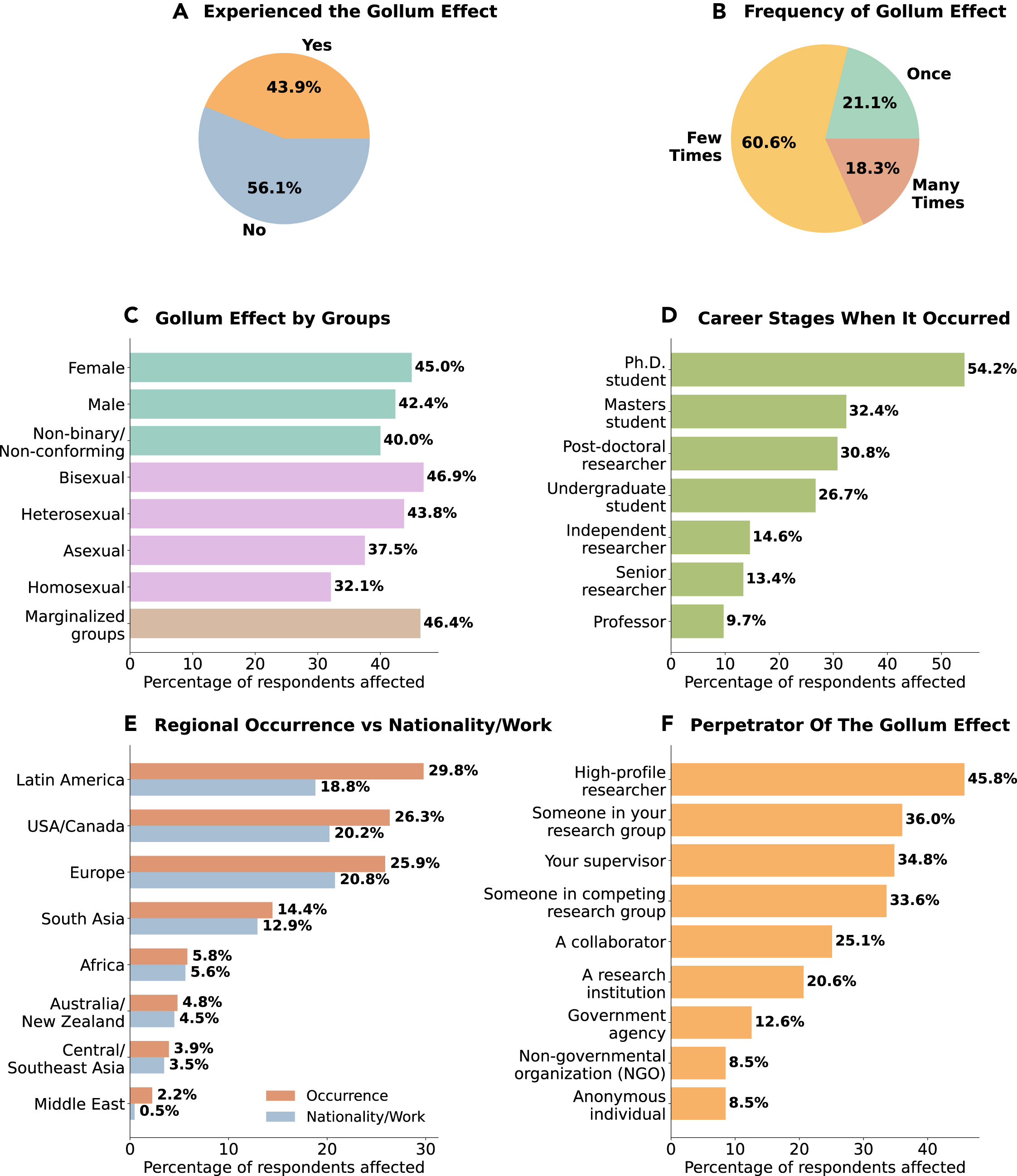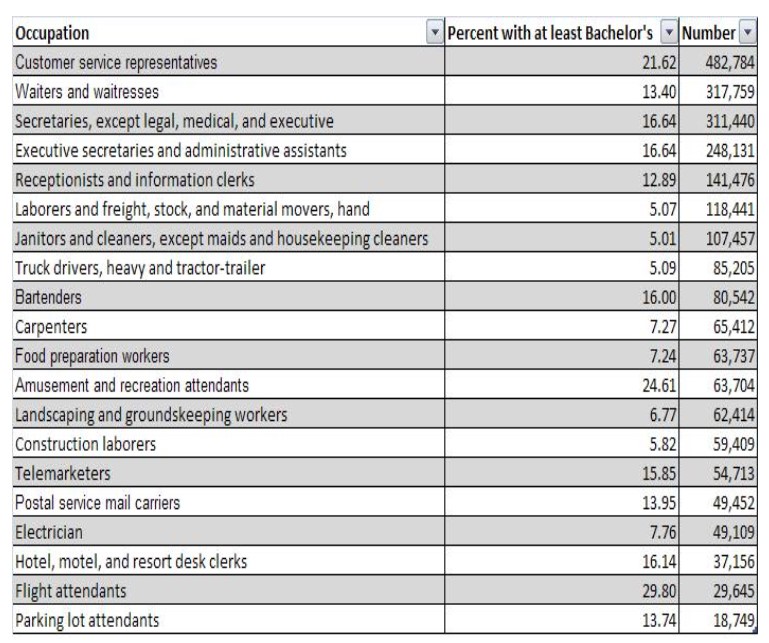'Stay in your lane', 'do you want to die on that hill?' and other territorial and undermining behavior were reported by 44% of predominantly ecologists who responded to a survey. They say it was most common as graduate students, a third of the time by their own supervisor. Of those, 18 percent reported they had experienced it multiple times.
This toxic possessiveness and gatekeeping in ecology is at a critical point, they say, which means it is probably also the case in other parts of academia. They deem it "The Gollum Effect", after the character in J.R.R. Tolkein's "The Hobbit" of 1937, who wanted to hoard everything he could.

In fairness to the ecology community, this has to be taken in context because it is surveys.(1) But this was 563 responses and including 64 nationalities so it is as statistically meaningful as surveys can ever be. Of the 'yes' responses, 54% said the toxic possessiveness and gatekeeping happened in graduate school.
Academia is a pressure cooker. Universities degree 600% more Ph.D.s than there are jobs in academia(2), and if you are the 1 in 6 in science who stays in science, there is only a 12% chance you will ever get an R01 grant. Ever. Thanks to better health outcomes, researchers are working longer and remaining competitors for funding. Without a grant, you are working for someone else who got a grant, basically being a lowly-paid post-doctoral researcher until you reach your 40s and probably give up and join the private sector.

Link
The authors are concerned that 20 percent had left academia but that actually undermines their argument that ecology is corrosive. Overall, the number is 40% and even that is lower than it should be if people were making rational decisions, given the actual availability of academic jobs each year.

There are jobs for 16% of Ph.D.s, grants for 12% over their entire careers, yet 60% are staying? Science journals need to promote the machine that produces the work they profit from but it is silly to claim that 40% leaving for better-paying jobs with greater work-life balance is a crisis when the reason universities claim to exist is to make better educated people for the real world.
If it was more than 84 percent in ecology, that would be a concern. Claiming that they left academia because of gatekeeping and toxic possessiveness by a researcher may be just rationalization. Maybe they were not going to make it in that cut-throat world anyway.
With reliance on government funding, academia has always been competitive. The funding plummets during the Clinton years are being matched by this Trump administration and that is only going to make it even more stressful.(3)
Yet just because ecology is not seeing mass departures compared to other fields does not mean they are not feeling impacted by it more.
Experience is shaped by not only your life but your own personality characteristics. If ecology, like some other social sciences, is overrun with fragility about even being on a planet with anyone different than them, like in this image making the rounds on social media, it may explain why they feel so abused. Behavior that perhaps others wouldn't be as shaken over could be crippling.

When I was young, Republicans had to pay marketing agencies to promote the belief that Democrats were such snowflakes. Now Democrats do it to themselves on social media every day.(4)
It's hard to imagine a particle physicist being terribly sensitive by the time they get into graduate school. They get the full blast starting in Conceptual Physics 101.
Academics report more mental health issues than the general public and when that is discussed they blame the stress of writing grants and doing research but rarely considered is that causal arrows may be going the wrong way. It may not be that academia creates mental health problems, it may be that people with mental health problems stay in academia because they were encouraged to stay. The federal government, and universities fat with cash after Democrats made student loans unlimited in the late 1980s, have spent billions of dollars since the 1990s telling students that academic science was real science, unlike that work-for-hire stuff they suggested was happening in the private sector. Government funding was used to try and convince the best and brightest to work for the government, not the companies which make government funding possible.
Being told academia is a safe, wholesome place with less pressure could mean that people with mental health issues decided to stay. And therefore they feel the impacts more severely.
Academia is not a safe place, it is not less work. Anyone who claims otherwise is selling you something.
NOTES:
(1) Just over a decade ago, an anthropologist produced a survey-based claim about abuse and harassment in the field and allied progressives dutifully repeated it. I was the only one who checked the methodology of the claim, and I only did that because the supernatural results obviously defied Occam's Razor. The authors refused to show any data, but their method stated the survey was uncontrolled. Anyone could fill it out. All they had to do to be a 'yes' in the harassment column was to have overheard a joke they didn't like. To people outside humanities buildings, if a joke sends someone into an emotional spiral, it's difficult to imagine what would happen if they were around the blunt methods of physicists and mathematicians. Basically, I was the only one who didn't want to believe going into the paper that progressive academics are secretly sexual predators. And I was bullied by the author and her social justice warrior friends across social media. The comments I got in my Twitter mentions; 'do you want to die on that hill?', 'stay in your lane', etc. From people, overwhelmingly women, in the social sciences. This 2018 article notes that bullying behavior by academics is so common, not just by women in the social sciences, that I can't feel special.
(2) I have not researched this since writing Science Left Behind but Bureau of Labor statistics data showed 5,000 Ph.D.s were working as janitors and 8,000 were wait staff. They were chronically underemployed.

In total, 17,000,000 should not have gone to college, but Democrats making student loans unlimited - it was suddenly a 'right' to higher income that a college degree brought in statistics that should be available to all - was brilliant strategy. Academia had already shifted left since 1970 and this caused a huge lurch to their party. Today, finding a young Republican faculty member in a university is less common than a handicapped person or native-American despite Republicans being 44% of the public.
(3) His is the first administration in history where a Republican in charge has meant less science funding, that is usually what Democrats engage in. As Dr. Neil deGrasse Tyson recently restated and we showed in Science Left Behind, President Eisenhower increased science funding a whopping 366% over his Democratic predecessor while President George W. Bush boosted it 54% after the cuts and stagnation of Clinton. President Reagan is less over Carter even though he was the most pro-science president since Jefferson.
(4) I'd feel bad for the supermajority of people in academia and journalism who don't vote Republican having to endure policy created by Bobby Kennedy if they hadn't greenwashed him for decades by saying he was "anti-corporate", not anti-science, when he was going on about food coloring, vaccines, cell phones, and farming. He instead got a halo because he raised so much money for Democrats that President Obama even tried to get him in as head of EPA. Before his team convinced him that Republicans would recruit a few people in the Democratic party that would never approve him and his name was taken off the table.
That's right, Kennedy was too goofy for a guy who surrounded himself with UFO believers, the Dick Cheney of Democrats, a JFK conspiracy theorist, and a guy who thought girls can't do math. But only after those people convinced him Kennedy was wrong for the job.





Comments